A good friend of ours is a Peace Corps volunteer in South Africa. She doesn’t have a blog (despite my ardent encouragement and hopes of it, the remoteness of her assignment make it easier to simply send an email when possible) but when she writes, she does so with beauty and thoughtfulness and reflection.
Which is why I am posting a passage in one of her last email’s here.
I know that the tone of my letters and email about my time in South
Africa have been mostly up-beat and generally full of the anecdotes
and general hilarity that come with learning and blending with a new
culture as well as my usual crazy adventures. Â All of these are very
accurate and quite true, but I think it is important for me to convey
that this is also only half the story. Â The cultures of South Africa
tend to downplay things undesirable or possibly unbecoming, and there
is a very vibrant tradition of singing-through-the-tears. Â It is easy
therefore, coupled with my personal mental default-setting being humor
rather then melancholy, to simply write my letters to those far away
about the superficial ups and downs of daily life without delving into
the harder daily experiences which are a communal understanding yet an
elephant-in-the-corner with my fellow PCVs and community members.Therefore, in an effort to share some of the other realities of life
in South Africa, this is a little more about the situation and
community of which I am now a part.I live in a village without a clinic. Â It has one tar road, one shop
to get bread and a few other sundries, one ‘bottle shop’ for the
procurement of alcohol, and one primary school. Â It has three
burial-grounds. Â In a country where one in five people are
HIV-positive and upward of 95% have latent tuberculosis, this ratio of
cemeteries to services is far from uncommon. Â About half of the
patients at my organization are wheelchair bound, yet we are located
off of a dirt road on uneven and rocky terrain – just like their
houses (if they one of the fortunate amongst our clients and have a
house). Â My community members have lived their whole lives in full
visibility of the platinum mines and limestone quarries which produce
a sizable wealth for the upper-echelons of the country, but they will
never see even enough of that money to pay a visit to the private
hospital in Rustenburg (35 km away) to get the medications they need
when they are sick. Â My host brother came home mad as hell on Friday
night – Good Friday – after witnessing a car accident in which six
people were injured because someone in a sports car going to the
largest casino on the continent (20 km away) wasn’t paying attention
when making a turn. Â Two of those people will get the care they need,
and afterward make it to the near-by resort, the place where, if they
were lucky (not to mention survive the accident), the other four could
potentially get a job, but never afford to visit. Â South Africa is a
place where the “first-world†and “third-world†sit in uneasy
juxtaposition. Â Unlike where infrastructures are non-existent or there
is more homogeneity in the human condition, poor South Africans see
every day the things they will never have (there is no judgment in
that statement of who is worse off, it is just a thought on the range
of hardships being undertaken by different populations).If you have read this far, thank you for humoring me. Â Again, I am
always more then happy to talk more deeply about any of these subjects
or to entertain questions. Â I also hope that it is understood that
these truths aren’t the only side of the story, either.  I am always
and continually amazed at the resilience people have to all that is
thrown at them. Â South Africans sing, they sing a lot, but there are
also many tears.
I love the contrasts within her discussion and how they serve as a way to understand the human condition within — one school to three graveyards, affluence to poverty, accident to luck. Reasons why, she argues, for there to be many tears — but also (and this is where I start to pull her words a little further) reasons why unrest, uprising, and violence may be not only common but justified in this type of environment.
One of my passions in public health is ecological research — or, literally, studies that look to how a total environment (particularly social environment) impacts health. This mode of research is still quite new, but exploratory studies suggest that when great divisions in wealth and poverty exist within a community, everyone within it experiences less optimal health. In short, what we are starting to understand (at least, scientifically) is that common good benefits everyone. It doesn’t take a lot of thought, then, to see why staying in Louisiana is important to me, at least, as a scientist.
This month’s Just Posts give fuel to the common good fire — and, as always, do so in varied and inspirational ways. Giving props to corporations moving to fair trade products, discussing the importance of math and realities of education in poor regions of the world, illustrating the connection between cheap and available produce to labor exploitation, celebrating notable “Days” in March with personal stories and insight.
Thank you, readers and writers! And please please — if you read something this month that inspires and informs and would be perfect for the next roundtable, send it on!
The March Just Posts
- Thailand Chani of Finding My Way Home with Would you like to be a hero?
- TeacherC at An (aspiring) Educator’s Blog with Investigating Social Inequity in the Mathematics Classroom
- Tash at Awful but Functioning with Whadaya Know Georgia.
- Rebecca at Flying Tomato Farms with The cost of a winter tomato
- prof susurro at like a whisper with Today is World Water Day and Women Aviators Make Herstory
- Paul Newnham of Give a damn about poverty? with Congrats Cadbury and Fairtrade this Easter
- Painted Maypole of Painted Maypole with An education in the jungle
- Mary at Them’s My Sentiments with A House Made of Asbestos
- Mad at Under the Mad Hat with More posts about buildings and food
- Kyla at The Journey with The Speech
- jen at One Plus Two with day 37: getting real
- girlgriot at If you want kin you must plant kin with Preach Responsibly and Missing the Point
- Erika of Be gay about it. with And so we wait.
- Em at Social Justice Soapbox with some random thoughts on giving
- Curtis at can’t see the forest with Beautiful Horizon, where hunger is on its way out
- Christopher at One Dollar Diet Project with (f)armed conflicts
- bon at cribchronicles with stuck in the freudian anal phase
- Ann Douglas at ParentCentral.ca with The Other Mothers
- almost idealist at One Year to Change the World with Equality for women: 2009 and we’re still not there and Time for a change
- alejna of collecting tokens with finding a way to volunteer with my hands full
This month’s readers:
Alejna, my JP accomplice, has words of wisdom with the list, as well as lyrics and performance of the very song whose lyrics graced the wall above my desk through college and at least three jobs (as if I needed more evidence of how much she rocks?!) — please stop over and say hello!
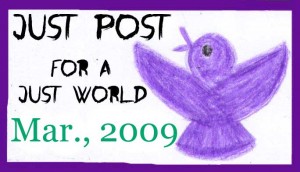
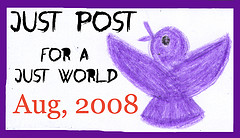
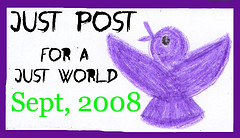
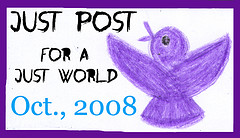


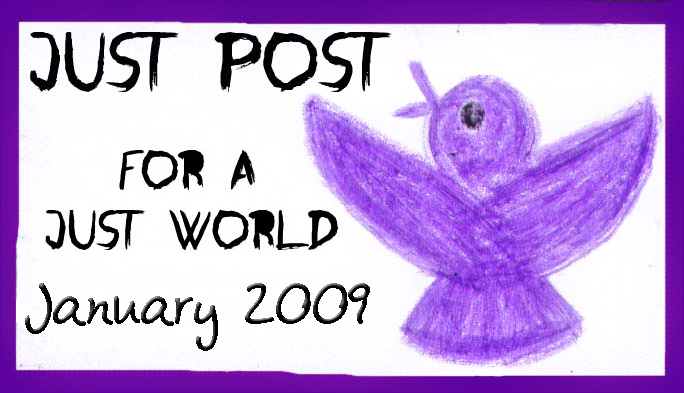
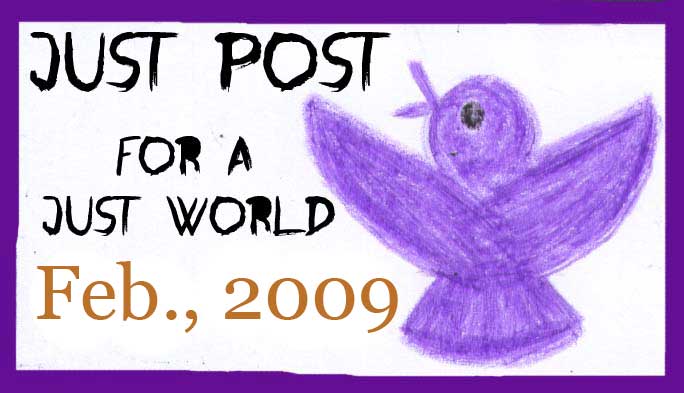








de | 15-Apr-09 at 3:12 pm | Permalink
Thank you, thank you, thank you for your efforts in maintaining the Just Posts. Each month I find new inspiration.